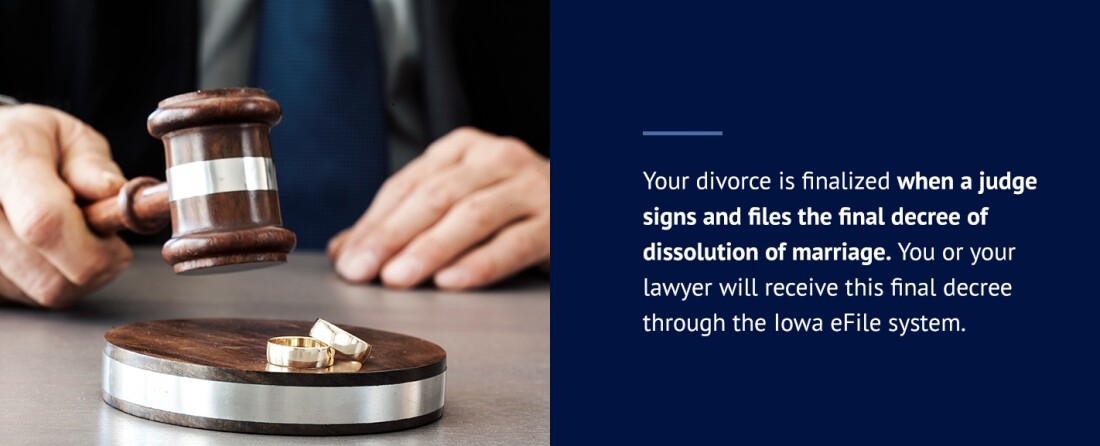Iowa Divorce Guide
Iowa Divorce Guide
Divorce—formally referred to as dissolution of marriage in Iowa—can be difficult to navigate without the legal assistance of an experienced Iowa divorce lawyer. What is the process of filing for a divorce in the state? How will your marital property be divided between you and your spouse after divorce? How long does it take to file for divorce?
This complete Iowa divorce online guide will answer any questions you may have about how to get a divorce in Iowa and ensure you understand the important considerations when filing for divorce.
What Is the Difference Between Annulment, Separation, and Divorce?
If you are in an unhappy marriage in Iowa, you may be seeking to end the union via a divorce, annulment, or legal separation. Below, we give an overview of each option to help you determine which one is right for you.
Divorce

Divorce in Iowa is defined as a legal and permanent end to a valid marriage. You can file for a divorce in Iowa when the marriage has broken down and there is no reasonable likelihood the marital relationship can be preserved.
Iowa divorce filings require you to meet residency requirements and wait a minimum period of time before your divorce is final. Your property will be divided equitably, and the court will approve the custody arrangement if children are involved.
Annulment
An annulment is defined as an end to an invalid marriage. An annulment in Iowa can be based on incest, bigamy, impotence, incompetence, or one spouse being under the legal age for marriage. However, certain conditions must exist for these factors to be grounds for annulment.
For example, for an annulment on the grounds of incest, the spouses must be first cousins or closer. Whether you and your spouse had a child during the marriage will not affect your ability to get an annulment.
Legal Separation
A legal separation in Iowa will do everything that a divorce will do (divide property, establish custody of children, etc.) however at the end of the process the parties are still legally married. Similar to divorce, legal separation has a minimum waiting period and requirements for residency. If you are the spouse filing for legal separation and your spouse is an Iowa resident, you will not have to meet a residency requirement.
Unlike divorce, neither spouse can remarry before the court converts the legal separation to a divorce. In the future, if a divorce becomes necessary, the parties will be required to file for divorce and the agreements reached during the separation process may be modified.
What Are the Grounds for Divorce in Iowa?
Iowa is a no-fault state, meaning you and your spouse do not need to disclose details about why you're seeking a divorce. You only need to tell the court that irreconcilable differences exist and there's no hope of preserving your marriage.
Iowa Divorce Checklist
You can file for a divorce in a few different ways, but there are some steps that are the same no matter which type of divorce you choose. The Iowa divorce checklist below will help you get started.

1. Collect Financial Information
One of the biggest concerns you may have about getting divorced is how your assets and liabilities will be divided. To start, you should request a free credit report. A free credit report will help you determine where your credit stands and whether you should focus on increasing your credit score before your divorce.
Next, list all your marital debts and assets. This is a good starting point for determining what will be divided between you and your spouse. After you have completed these steps, you should gather as much financial information as you can, such as:
- Car information: Collect the financial information for your cars, including your car registration and loan statements.
- Account information: Collect the financial information for your checking, savings, and investment accounts, such as your bank statements, credit card statements, investment account statements, retirement account statements, and pay stubs from the past few months.
- Property information: Collect the financial information for your properties, including mortgage statements, deeds to real estate, and real estate appraisals.
- Income information: Collect paystubs of the parties for the past two months. Collect copies of personal income tax returns for the past 3-5 years.
2. File a Petition for Dissolution of Marriage and Other Paperwork
After gathering your financial information, you will file for a Petition for Dissolution of Marriage. As the filing spouse, this divorce petition will generically lay out what you want in terms of child custody and support, property division, spousal support, and payment of court costs and attorney's fees. After filing this petition, a copy needs to be served to your spouse.
Though every divorce is unique, you will likely need to fill out some of the following documents as well:
- Confidential Information Form
- Original Notice for Personal Service
- Directions for Service of Original Notice
- Motion and Affidavit to Serve by Publication
- Original Notice by Publication
- Acceptance of Service
- Application and Affidavit to Defer Payment of Costs
You must file your forms with the district court in the county where you or your spouse resides.
3. Serve the Notice to Your Spouse
After filing your paperwork, you must notify your spouse about the divorce. You can either serve your spouse via certified mail or in person. Alternatively, the sheriff's office can serve the divorce papers on your behalf.
Regardless of which method you choose, you should serve these papers as soon as possible, as your case can be dismissed if too much time lapses.
Residency Requirement for an Iowa Divorce
In the case that a defendant spouse is an Iowa resident and was served the papers for the dissolution of marriage, the filing spouse for the dissolution of marriage does not need to be a resident of Iowa. If this is not the case, then there is a residency requirement of one year before beginning the Iowa divorce process.
How Will Marital Property Be Divided?
Iowa is an equitable distribution state, which means property acquired during the marriage is distributed equitably between a divorcing couple. Multiple factors are taken into consideration when dividing a couple's assets and debts, such as:
- The needs of both parties
- How long the couple was married
- The vocational skills of each spouse
- The custody decision for minor children
- The economic circumstances of each spouse
- The duration and amount of an alimony award
- Any marital or premarital settlement agreement
- The duration and amount of maintenance payments
- What each party contributed financially to the marriage
- The emotional health, physical health, and age of each spouse
- What each spouse contributed in childcare or as a homemaker
- Whether the asset or debt was acquired prior to or during the marriage
- Whether the property award is in addition to or in place of an alimony award
- The consequences for federal income tax from the court's division of the marital property
- The expense and time needed to acquire training and skills to become self-sufficient
- Whether a portion of the assets will be put in a fund for the education, support, and maintenance of minor children
- The contribution by a spouse to the training, enhanced earning capacity, or education of the other spouse
- The appeal of awarding the spouse who has custody of minor children with ownership of the family home
- The expense and time needed for a spouse to acquire education sufficient enough to find appropriate employment
- The current and potential earning capacity of both spouses, including training, work experience, employment skills, educational background, and length of absence from the workforce
Marital fault is not considered when dividing the marital property.
How Long Does It Take to File for Divorce in Iowa?

Iowa Code section 598.19 specifies the waiting period of a divorce in the state. No divorce will be granted before 90 days following the date the original notice is serviced, from the day the waiver or the acceptance of original notice is filed, or from the last date of publication of notice, whichever time period is longer. However, there are circumstances under which the court may decide to waive the waiting period.
Depending on the circumstances of your case, your divorce could last several weeks longer than the 90-day minimum. How long a divorce takes depends on if the county court is dealing with a backlog and whether the issues have been resolved or not. A contested Iowa divorce filing with several disagreements and issues to settle can take several months or even a couple of years.
In addition, the court may order you and your spouse to undergo Iowa divorce mediation under Iowa Code Section 598.7. During that process, you'll sit down with a neutral third party—a mediator—to discuss and try to resolve conflicts over issues like alimony, custody, parenting time, child support, and asset distribution.
Your divorce is finalized when a judge signs and files the final decree of dissolution of marriage. You or your lawyer will receive your Iowa divorce papers through the eFile system.
Child Support Considerations
Under Iowa law, child support is based upon the parties’ incomes, as well as the physical custody agreement. Even in a shared physical care or joint physical care arrangement, there may still be a child support order. The Supreme Court of Iowa has set child support guidelines for child support payments unless the court can determine in writing that applying the guidelines would result in the occurrence of an injustice. The support payments may be adjusted for fairness or for the special needs of the couple's child.
These guidelines take the number of children who need support and both parents' net incomes into consideration. While the dissolution of marriage is pending, the court may order temporary child support if requested.
Child support may be modified or changed, but there must be a material change of circumstance that was not contemplated by the parties and the court at the time the child custody decision was made. Child support payments are not tax-deductible for the person paying them or taxable for the recipient. Additionally, support payments may be required to be paid to the court directly.
Child Custody
In Iowa, there are two types of custody: Legal and Physical. Sole or joint legal custody may be awarded in a way that will encourage both parents to share the responsibilities and rights of raising the child depending on the child's best interests. Rights and responsibilities include the right to make decisions regarding the major decisions about a child: religion, education, medical and extra-curricular activities. Joint legal custody will likely be awarded if requested by either parent and if this custody decision is in the child's best interests.
If the court does not award joint legal custody, the reasons for doing so must be stated.
Physical care or physical custody is custody in the manner that most people think about custody: where a child is living on a day to day basis.
The following factors will determine physical custody for a family:
- The child's reasonable preference
- The suitability and fitness of the parents
- How close the parents live to one another
- Whether there is a history of domestic abuse
- The parents' ability to cooperate and communicate
- Whether each of the parents would be suitable custodians
- Whether each parent agrees to joint custody or one is opposed to joint custody
- Whether each parent has actively cared for the child prior to and during the separation
- The ability of both parents to support the relationship between the child and the other parent
- Whether the child's safety will be jeopardized by unsupervised visitation or an award of joint custody
- Whether the child's development and emotional and psychological needs will suffer due to lack of contact and attention from both of his or her parents
Joint physical custody is not required for joint legal custody, which means physical custody can be awarded to one parent and visitation rights can be granted to the other parent. If custody for the child is in dispute, joint physical custody, known as 50-50 custody, may not be awarded. The court is also not likely to separate siblings into different homes.
Before you move out of the home you shared with your spouse, you should consult a lawyer if you want primary physical care or custody.
Will I Need to Pay Alimony?
Alimony, also known as spousal support, may be granted to a spouse for an indefinite or limited time. The following are some of the factors that will determine whether a spouse will be granted spousal support:
- The length of the marriage
- The emotional health, physical health, and age of each spouse
- The time needed to acquire adequate training and education for finding appropriate employment and becoming self-sufficient
- The financial resources available to the spouse who is seeking spousal support, including the spouse's ability to independently meet his or her needs and the marital property awarded to the spouse
DO I NEED AN IOWA DIVORCE ATTORNEY?
Our Iowa divorce attorneys at Whitfield & Eddy Law will provide you with practical, effective, and carefully crafted solutions to legal challenges. We are experienced and knowledgeable, and we will take a proactive approach in and out of court to yield positive outcomes.
A divorce attorney that is knowledgeable in Iowa divorce law can assist you through every step of the divorce process. If you do not seek legal representation, you may fail to anticipate the consequences of your lawsuits or miss important issues that could affect the outcome of the process.
If you have significant marital assets or children and you are considering divorce, you should speak to an experienced divorce attorney.
Receive Legal Support From the Attorneys at Whitfield & Eddy Law
Our attorneys at Whitfield & Eddy Law will provide you with practical, effective, and carefully crafted solutions to legal challenges. We are experienced and knowledgeable, and we will take a proactive approach in and out of court to yield positive outcomes.
We work closely with families and individuals throughout the Midwest and the nation. Ultimately, our focus is on providing legal counsel that can anticipate the needs of our clients. Is your family dealing with the dissolution of marriage and pursuing a divorce settlement? Contact us at Whitfield & Eddy Law to learn more about Iowa divorce guidelines and discuss your divorce case today.



